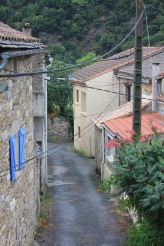In my tribute to Eugene and Pieter, I spend some time introducing the nature of the environment in which Eugene and I were brought up. In order to understand my brother, his experiences and the type of person he was it is necessary to understand the environment which shaped him in so many ways.
A number of events this week reminded me just how deeply the culture of our immediate environment contributes to our behaviours. Their influence will more often than not determine the choices we do or don’t make. We had a strict upbringing that advocated moderation in every way other than work. Our Calvinistic envir onment meant that working hard was seen as honorable. This philosophy was possibly taken to extremes by a further belief that considered idleness to be avoided at all costs. An idle state was seen as leading to all manner of bad behaviours that will eventually get one into trouble. However, the result was that one was forever driven to be active and suffered feelings of guilt when indulging in any time for relaxation.
onment meant that working hard was seen as honorable. This philosophy was possibly taken to extremes by a further belief that considered idleness to be avoided at all costs. An idle state was seen as leading to all manner of bad behaviours that will eventually get one into trouble. However, the result was that one was forever driven to be active and suffered feelings of guilt when indulging in any time for relaxation.
Coupled with this need to avoid idleness was the exercise of constraint over impulses including that of joyfulness. Tears were expected to follow too much jollity. A family of four children on holiday in our village with their parents once again reminded me of this saying. Our house in France faces the village square. This means we are very much in the heart of the comings and goings of the village. Opposite our house is the second home of a family living in one of the large cities in France, which they normally rent out during the summer months
The family holidaying here at the moment came across as a very jovial and joyful lot. They spent hours playing and chasing each other in the pool, accompanied by what I thought at times to be excessive shrieks of laughter (or was this my own cultural values of constraint kicking in?). I reflected on how rarely I have encountered such a happy family with parents clearly enjoying every minute with their children. However, today saw an equally vocal argument between the parents with a visible distressing impact on the younger boy. Of course every family has disagreements, but I was reminded of our cultural admonishment that just as night follows day, tears would inevitably follow laughter.
A few days ago I read a very moving posting of a fellow blogger who is sharing her experiences of coping with terminal cancer. Having responded to treatment for a period of time, her cancer returned with a vengeance. Her oncologist confirmed the inevitable, but guaranteed she would at least have the summer months. She decided to delay the treatment she would need to help with the increased pain for two months and have a final summer with her family, travelling to the States for a holiday they had always planned for ‘one day’. Unfortunately, that ‘one day’ never came as she took a sudden turn for the worst.
This triggered in my mind the debate between delayed vs instant gratification. Again, there are no hard and fast rules. Exercising constraint where gratification is concerned teaches us self-discipline and helps us to achieve our goals.  On the other hand, seeking instant gratification can have negative consequences for both the individual as well as others. An example that comes to mind is the greed of the bankers and their addiction for immediate gratification, which has resulted in the collapse of many economies. The repercussions of their pursuit for instant gratification have had significant and long-term consequences for many people around the world.
On the other hand, seeking instant gratification can have negative consequences for both the individual as well as others. An example that comes to mind is the greed of the bankers and their addiction for immediate gratification, which has resulted in the collapse of many economies. The repercussions of their pursuit for instant gratification have had significant and long-term consequences for many people around the world.
How does all this relate to Eugene and his journey with terminal cancer? In the first instance, his work ethic meant he continued to work in a stressful environment despite the pain and side affects from his treatment that he had to endure. The positive of this was it helped to take his mind off coping with cancer and everything that went with that. On the other hand would he have had more time and energy in the early stages of cancer to allow himself to indulge in things he denied himself because they may have been seen as too indulgent or frivolous? Having delayed gratification until later in his life, he had run out of time, health and energy to enjoy the things he had always dreamt of doing once he retired.
My conclusion is that it is ultimately about maintaining a happy balance without having the pendulum swing too far from one side to the other.


 The tension we create through the use of emotions, conflict and controversy is what attracts readers to our writing. Writing that inspires, captivating the imagination of the reader, requires writers to embrace and acknowledge their darker side. Writers need to dive into the deep, dark waters where emotions live. Only then will they be able to take the reader on the emotional journey of the characters, whether they are fictional or real.
The tension we create through the use of emotions, conflict and controversy is what attracts readers to our writing. Writing that inspires, captivating the imagination of the reader, requires writers to embrace and acknowledge their darker side. Writers need to dive into the deep, dark waters where emotions live. Only then will they be able to take the reader on the emotional journey of the characters, whether they are fictional or real.
 These behaviours are normally repetitious and may seem unrelated to the actual process of writing. These actions, even though mundane, serve to set the scene and get us into the right frame of mind for creative thinking. Writing rituals help to reduce the anxiety of writing and engender a sense of being in control of the activity of writing. Furthermore, it also creates discipline and structure without which there would probably be no creative output. One of my all time favourite examples of eccentric writing rituals is that of the poet Friedrich Schiller who found inspiration from the smell of rotting apples underneath his desk! It reminded him of when he was young and very much in love, wandering through the apple orchards.
These behaviours are normally repetitious and may seem unrelated to the actual process of writing. These actions, even though mundane, serve to set the scene and get us into the right frame of mind for creative thinking. Writing rituals help to reduce the anxiety of writing and engender a sense of being in control of the activity of writing. Furthermore, it also creates discipline and structure without which there would probably be no creative output. One of my all time favourite examples of eccentric writing rituals is that of the poet Friedrich Schiller who found inspiration from the smell of rotting apples underneath his desk! It reminded him of when he was young and very much in love, wandering through the apple orchards.